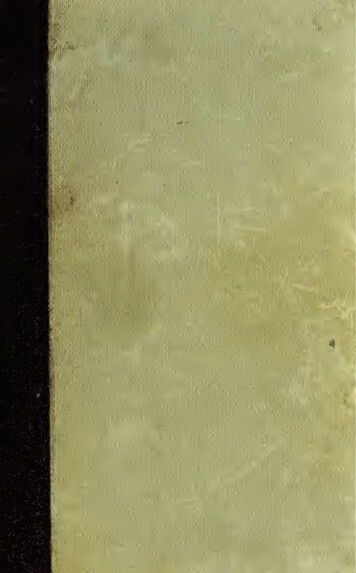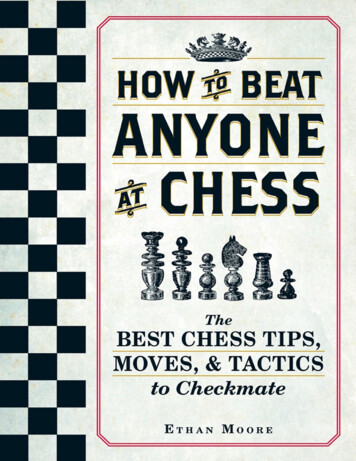
Transcription
THE FOUR LOVES
Also by C. S. Lewis:REFLECTIONS ON THE PSALMSSURPRISED BY JOYTHE SCREWTAPE LETTERSMERE CHRISTIANITYMIRACLESTHE PROBLEM OF PAINTRANSPOSITIONTHE PILGRIM’S REGRESSTHE GREAT DIVORCEGEORGE MACDONALD: AN ANTHOLOGYTHE ABOLITION OF MANBROADCAST TALKSBEYOND PERSONALITYCHRISTIAN BEHAVIOURFor Children :THE LION, THE WITCH AND THE WARDROBEPRINCE CASPIANTHE VOYAGE OF THE DAWN TREADERTHE SILVER CHAIRTHE HORSE AND HIS BOYFiction:TILL WE HAVE FACES
The Four Loves11byC. S. LEWISThat our affections kill us not,nor dye.donneGeoffrey BlesLONDON
Printed in Great Britain byCox dr Wyman Ltd., Fakenhamfor the publishersGeoffrey Bles LtdJ2 Doughty Street, London WCiFirst Published in i960 c. s.lewis,i960
TOChad Walsh
Digitized by the Internet Archive. in 2017 with funding fromDuke University Librarieshttps://archive.org/details/fourloves01 lewi
ContentsiIntroduction11Likings and Loves for the arity1339
V
CHAPTER IIntroductionis love,” says St. John. When I first tried towrite this book I thought that his maxim wouldprovide me with a very plain highroad through thevtodwhole subject. I thought I should be able to say thathuman loves deserved to be called loves at all just in sofar as they resembled that Love which is God. Thefirst distinction I made was therefore between what Icalled Gift-love and Need-love. The typical exampleof Gift-love would be that love which moves a man towork and plan and save for the future well-being of hisfamily which he will die without sharing or seeing; ofthe second, that which sends a lonely or frightenedchild to its mother’s arms.There was no doubt which was more like LoveHimself. Divine Love is Gift-love. The Father givesall He is and has to the Son. The Son gives Himselfback to the Father, and gives Himself to the world, andfor the world to the Father, and thus gives the world(in Himself) back to the Father too.And what, on the other hand, can be less like any thing we believe of God’s life than Need-love? Helacks nothing, but our Need-love, as Plato saw, is“the son of Poverty”. It is the accurate reflection in9
The Tour Lovesconsciousness of our actual nature. We are born help less. As soon as we are fully conscious we discoverloneliness. We need others physically, emotionally,intellectually; we need them if we are to know any thing, even ourselves.I was looking forward to writing some fairly easypanegyrics on the first sort of love and disparagementsof the second. And much of what I was going to saystill seems to me to be true. I still think that if all wemean by our love is a craving to be loved, we are in avery deplorable state. But I would not now say (withmy master, MacDonald) that if we mean only thiscraving we are mistaking for love something that is notlove at all. I cannot now deny the name love to Needlove. Every time I have tried to think the thing outalong those lines I have ended in puzzles and con tradictions. The reality is more complicated than Isupposed.First of all, we do violence to most languages,including our own, if we do not call Need-love “love”.Of course language is not an infallible guide, but itcontains, with all its defects, a good deal of storedinsight and experience. If you begin by flouting it, ithas a way of avenging itself later on. We had betternot follow Elumpty Dumpty in making words meanwhatever we please.Secondly, we must be cautious about calling Needlove “mere selfishness”. Mere is always a dangerous,word. No doubt Need-love, like all our impulses, canbe selfishly indulged. A tyrannous and gluttonousdemand for affection can be a horrible thing. But inio
Introductionordinary life no one calls a child selfish because itturns for comfort to its mother; nor an adult whoturns to his fellow “for company”. Those, whetherchildren or adults, who do so least are not usually themost selfless. Where Need-love is felt there may bereasons for denying or totally mortifying it; but not tofeel it is in general the mark of the cold egoist. Sincewe do in reality need one another (“it is not good forman to be alone”), then the failure of this need toappear as Need-love in consciousness—in other words,the illusory feeling that it is good for us to be alone—is a bad spiritual symptom; just as lack of appetite is abad medical symptom because men do really needfood.But thirdly, we come to something far moreimportant. Every Christian would agree that a man’sspiritual health is exactly proportional to his love forGod. But man’s love for God, from the very nature ofthe case, must always be very largely, and must oftenbe entirely, a Need-love. This is obvious when weimplore forgiveness for our sins or support in ourtribulations. But in the long run it is perhaps evenmore apparent in our growing—for it ought to begrowing—awareness that our whole being by its verynature is one vast need; incomplete, preparatory,empty yet cluttered, crying out for Him who can untiethings that are now knotted together and tie up thingsthat are still dangling loose. I do not say that man cannever bring to God anything at all but sheer Needlove. Exalted souls may tell us of a reach beyond that.But they would also, 1 think, be the first to tell us that
The Four Lovesthose heights would cease to be true Graces, wouldbecome Neo-Platonic or finally diabolical illusions, themoment a man dared to think that he could live onthem and henceforth drop out the element of need.“The highest,” says the Imitation, “does not standwithout the lowest.” It would be a bold and sillycreature that came before its Creator with the boast“I’m no beggar. I love you disinterestedly”. Thosewho come nearest to a Gift-love for God will nextmoment, even at the very same moment, be beatingtheir breasts with the publican and laying their in digence before the only real Giver. And God will haveit so. He addresses our Need-love: “Come unto me allye that travail and are heavy-laden,” or, in the OldTestament, “Open your mouth wide and I will fillit.”Thus one Need-love, the greatest of all, either coin cides with or at least makes a main ingredient inman’s highest, healthiest, and most realistic spiritualcondition. A very strange corollary follows. Manapproaches God most nearly when he is in one senseleast like God. For what can be more unlike thanfullness and need, sovereignty and humility, righteous ness and penitence, limitless power and a cry for help ?This paradox staggered me when I first ran into it; italso wrecked all my previous attempts to write aboutlove. When we face it, something like this seems toresult.We must distinguish two things which might bothpossibly be called “nearness to God”. One is likenessto God. God has impressed some sort of likeness to12
IntroductionHimself, I suppose, in all that He has made. Space andtime, in their own fashion, mirror His greatness; alllife, His fecundity; animal life. His activity. Man has amore important likeness than these by being rational.Angels, we believe, have likenesses which Man lacks:immortality'and intuitive knowledge. In that way allmen, whether good or bad, all angels including thosethat fell, are more like God than the animals are. Theirnatures are in this sense “nearer” to the DivineNature. But, secondly, there is what we may callnearness of approach. If this is what we mean, thestates in which a man is “nearest” to God are those inwhich he is most surely and swiftly approaching hisfinal union with God, vision of God and enjoyment ofGod. And as soon as we distinguish nearness-by likeness and nearness-of-approach, we see that theydo not necessarily coincide. They may or may not.Perhaps an analogy may help. Let us suppose thatwe are doing a mountain walk to the village which isour home. At mid-day we come to the top of a cliffwhere we are, in space, very near it because it is justbelow us. We could drop a stone into it. But as we areno cragsmen we can’t get down. We must go a longway round; five miles, maybe. At many points duringthat detour we shall, statically, be far further from thevillage than we were when we sat above the cliff. Butonly statically. In terms of progress we shall be far“nearer” our baths and teas.Since God is blessed, omnipotent, sovereign andcreative, there is obviously a sense in which happiness,strength, freedom and fertility (whether of mind orD
The Tour Lovesbody), wherever they appear in human life, constitutelikenesses, and in that way proximities, to God. But noone supposes that the possession of these gifts has anynecessary connection with our sanctification. No kindof riches is a passport to the Kingdom of Heaven.At the cliff’s top we are near the village, but howeverlong we sit there we shall never be any nearer to ourbath and our tea. So here the likeness, and in that sensenearness, to Himself which God has conferred uponcertain creatures and certain states of those creatures issomething finished, built in. What is near Him bylikeness is never, by that fact alone, going to be anynearer. But nearness of approach is, by definition,increasing nearness. And whereas the likeness is givento us—and can be received with or without thanks,can be used or abused—the approach, however initi ated and supported by Grace, is something we must do.Creatures are made in their varying ways images ofGod without their own collaboration or even consent.It is not so that they become sons of God. And thelikeness they receive by sonship is not that of images orportraits. It is in one way more than likeness, for it isunison or unity with God in will; but this is consistentwith all the differences we have been considering.Hence, as a better writer has said, our imitation of Godin this life—that is, our willed imitation as distinctfrom any of the likenesses which He has impressedupon our natures or states—must be an imitation ofGod incarnate: our model is the Jesus, not only of Cal vary, but of the workshop, the roads, the crowds, theclamorous demands and surly oppositions, the lack ofi4
Introductionall peace and privacy, the interruptions. For this, sostrangely unlike anything we can attribute to theDivine life in itself, is apparently not only like, but is,the Divine life operating under human conditions.I must now explain why I have found this distinc tion necessary to any treatment of our loves. St.John’s saying that God is love has long been balancedin my mind against the remark of a modern author(M. Denis de Rougemont) that “love ceases to be ademon only when he ceases to be a god”; which ofcourse can be re-stated in the form “begins to be ademon the moment he begins to be a god”. Thisbalance seems to me an indispensable safeguard. Ifwe ignore it the truth that God is love may slyly cometo mean for us the converse, that love is God.I suppose that everyone who has thought about thematter will see what M. de Rougemont meant. Everyhuman love, at its height, has a tendency to claim foritself a divine authority. Its voice tends to sound as if itwere the will of God Himself. It tells us not to countthe cost, it demands of us a total commitment, itattempts to over-ride all other claims and insinuatesthat any action which is sincerely done “for love’ssake” is thereby lawful and even meritorious. Thaterotic love and love of one’s country may thus attemptto “become gods” is generally recognised. Butfamily affection may do the same. So, in a different way,may friendship. I shall not here elaborate the point,for it will meet us again and again in later chapters.Now it must be noticed that the natural loves makethis blasphemous claim not when they are in their
The Four Lovesworst, but when they are in their best, natural con dition; when they are what our grandfathers called“pure” or “noble”. This is especially obvious in theerotic sphere. A faithful and genuinely self-sacrificingpassion will speak to us with what seems the voice ofGod. Merely animal or frivolous lust will not. It willcorrupt its addict in a dozen ways, but not in that way;a man may act upon such feelings but he cannot reverethem any more than a man who scratches reveres theitch. A silly woman’s temporary indulgence, which isreally self-indulgence, to a spoiled child—her livingdoll while the fit lasts—is much less likely to “becomea god” than the deep, narrow devotion of a womanwho (quite really) “lives for her son”. And I aminclined to think that the sort of love for a man’scountry which is worked up by beer and brass bandswill not lead him to do much harm (or much good)for her sake. It will probably be fully discharged byordering another drink and joining in the chorus.And this of course is what we ought to expect. Ourloves do not make their claim to divinity until theclaim becomes plausible. It does not become plausibleuntil there is in them a real resemblance to God, toLove Himself. Let us here make no mistake. es those are most God-like which are mostboundless and unwearied in giving. All the things thepoets say about them are true. Their joy, their energy,their patience, their readiness to forgive, their desirefor the good of the beloved—all this is a real and allbut adorable image of the Divine life. In its presence16
Introductionwe are right to thank God “who has given such powerto men”. We may say, quite truly and in an intelligiblesense, that those who love greatly are “near” to God.But of course it is “nearness by likeness”. It will notof itself produce ‘nearness of approach”. The likenesshas been given us. It has no necessary connection withthat slow and painful approach which must be ourown (though by no means our unaided) task. Mean while, however, the likeness is a splendour. That iswhy we may mistake Like for Same. We may give ourhuman loves the unconditional allegiance which weowe only to God. Then they become gods: then theybecome demons. Then they will destroy us, and alsodestroy themselves. For natural loves that are allowed tobecome gods do not remain loves. They are stillcalled so, but can become in fact complicated forms ofhatred.%Our Need-loves may be greedy and exacting butthey do not set up to be gods. They are not nearenough (by likeness) to God to attempt that.It follows from what has been said that we must joinneither the idolaters nor the “debunkers” of humanlove. Idolatry both of erotic love and of‘the domesticaffections ” was the great error of Nineteenth Centuryliterature. Browning, Kingsley, and Patmore some times talk as if they thought that falling in love was thesame thing as sanctification; the novelists habituallyoppose to “the World” not the Kingdom of Heavenbut the home. We live in the reaction against this. Thedebunkers stigmatise as slush and sentimentality a verygreat deal of what their fathers said in praise of love.B
The Four LovesThey are always pulling up and exposing the grubbyroots of our natural loves. But I take it we must listenneither “to the over-wise nor to the over-foolishgiant”. The highest does not stand without the lowest.A plant must have roots below as well as sunlightabove and roots must be grubby. Much of the grub biness is clean dirt if only you will leave it in thegarden and not keep on sprinkling it over the librarytable. The human loves can be glorious images of' Divine love. No less than that: but also no more—proximities of likeness which in one instance may help,and in another may hinder, proximity of approach.Sometimes perhaps they have not very much to dowith it either way.18
CHAPTER IILikings and Loves for the Suh-humanM ostof my generation were reproved as childrenfor saying that we “loved” strawberries, and somepeople take a pride in the fact that English has the twoverbs love and like while French has to get on withaimer for both. But French has a good many otherlanguages on its side. Indeed it very often has actualEnglish usage on its side too. Nearly all speakers,however pedantic or however pious, talk every dayabout “loving” a food, a game, or a pursuit. Andin fact there is a continuity between our elementarylikings for things and our loves for people. Since “thehighest does not stand without the lowest” we hadbetter begin at the bottom, with mere likings; andsince to “like” anything means to take some sort ofpleasure in it, we must begin with pleasure.Now it is a very old discovery that pleasures can bedivided into two classes; those which would not bepleasures at all unless they were preceded by desire,and those which are pleasures in their own right andneed no such preparation. An example of the firstwould be a drink of water. This is a pleasure if you arethirsty and a great one if you are very thirsty. Butprobably no one in the world, except in obedience toJ9
The Tour Lovesthirst or to a doctor’s orders, ever poured himself out aglass of water and drank it just for the fun of the thing.An example of the other class would be the unsoughtand unexpected pleasures of smell—the breath from abean-field or a row of sweet-peas meeting you on yourmorning walk. You were in want of nothing, com pletely contented, before it; the pleasure, which maybe very great, is an unsolicited, super-added gift. I amtaking very simple instances for clarity’s sake, and ofcourse there are many complications. If you are givencoffee or beer where you expected (and would havebeen satisfied with) water, then of course you get apleasure of the first kind (allaying of thirst) and one ofthe second (a nice taste) at the same time. Again, anaddiction may turn what was once a pleasure of thesecond kind into one of the first. For the temperateman an occasional glass of wine is a treat—like thesmell of the bean-field. But to the alcoholic, whosepalate and digestion have long since been destroyed,no liquor gives any pleasure except that of relief froman unbearable craving. So far as he can still discerntastes at all, he rather dislikes it; but it is better thanthe misery of remaining sober. Yet through all theirpermutations and combinations the distinction be tween the two classes remains tolerably clear. We maycall them Need-pleasures and Pleasures of Appreciation.The resemblance between these Need-pleasures andthe “Need-loves” in my first chapter will occur toeveryone. But there, you remember, I confessed that Ihad had to resist a tendency to disparage the Needloves or even to say they were not loves at all. Here,20
Likings and Loves for the Sub-humanfor most people, there may be an opposite inclination.It would be very easy to spread ourselves in laudationof the Need-pleasures and to frown upon those thatare Appreciatives: the one so natural (a word to con jure with), so necessary, so shielded from excess bytheir very naturalness, the other unnecessary andopening the door to every kind of luxury and vice.If we were short of matter on this theme we couldturn on the tap by opening the works of the Stoics andit would run till we had a bathful. But throughout thisinquiry we must be careful never to adopt prematurelya moral or evaluating attitude. The human mind isgenerally far more eager to praise and dispraise than todescribe and define. It wants to make every distinctiona distinction of value; hence those fatal critics who cannever point out the differing quality of two poets with out putting them in an order of preference as if theywere candidates for a prize. We must do nothing of thesort about the pleasures. The reality is too complicated.We are already warned of this by the fact that Needpleasure is the state in which Appreciative pleasuresend up when they go bad (by addiction).For us at any rate the importance of the two sorts ofpleasure lies in the extent to which they foreshadowcharacteristics in our “loves” (properly so called).The thirsty man who has just drunk off a tumbler ofwater may say, “By Jove, I wanted that.” So may thealcoholic who has just had his “nip”. The man whopasses the sweet-peas in his morning walk is morelikely to say, “How lovely the smell is.” Theconnoisseur after his first sip of the famous claret, may21
The Four Loressimilarly say, “This is a great wine.” When Needpleasures are in question we tend to make statementsabout ourselves in the past tense; when Appreciativepleasures are in question we tend to make statementsabout the object in the present tense. It is easy to seewhy.Shakespeare has described the satisfaction of atyrannous lust as somethingPast reason hunted and, no sooner had.Past reason hated.But the most innocent and necessary of Need-pleasureshave about them something of the same character—only something, of course. They are not hated once wehave had them, but they certainly “die on us” withextraordinary abruptness, and completely. The scullerytap and the tumbler are very attractive indeed when wecome in parched from mowing the grass; six secondslater they are emptied of all interest. The smell offrying food is very different before and after breakfast.And, if you will forgive me for citing the most extremeinstance of all, have there not for most of us beenmoments (in a strange town) when the sight of theword GENTLEMEN over a door has roused a joyalmost worthy of celebration in verse?Pleasures of Appreciation are very different. Theymake us feel that something has not merely gratifiedour senses in fact but claimed our appreciation byright. The connoisseur does not merely enjoy hisclaret as he might enjoy warming his feet when theywere cold. He feels that here is a wine that deserves22
Likings and Loves for the Sub-humanhis full attention; that justifies all the tradition and skillthat have gone to its making and all the years of train ing that have made his own palate fit to judge it. Thereis even a glimmering of unselfishness in his attitude.He wants the wine to be preserved and kept in goodcondition, not entirely for his own sake. Even if hewere on his death-bed and was never going to drinkwine again, he would be horrified at the thought ofthis vintage being spilled or spoiled or even drunk byclods (like myself) who can’t tell a good claret from abad. And so with the man who passes the sweet-peas.He does not simply enjoy, he feels that this fragrancesomehow deserves to be enjoyed. He would blamehimself if he went past inattentive and undelighted. Itwould be blockish, insensitive. It would be a shamethat so fine a thing should have been wasted on him.He will remember the delicious moment years hence.He will be sorry when he hears that the garden pastwhich his walk led him that day has now been swal lowed up by cinemas, garages, and the new by-pass.Scientifically both sorts of pleasure are, no doubt,relative to our organisms. But the Need-pleasuresloudly proclaim their relativity not only to the humanframe but to its momentary condition, and outside thatrelation have no meaning or interest for us at all. Theobjects which afford pleasures of appreciation give usthe feeling—whether irrational or not—that we some how owe it to them to savour, to attend to and praiseit. “It would be a sin to set a wine like that beforeLewis,” says the expert in claret. “How can you walkpast this garden taking no notice of the smell?” we23
The Four Lovesask. But we should never feel this about a Needpleasure: never blame ourselves or others for nothaving been thirsty and therefore walking past a wellwithout taking a drink of water.How the Need-pleasures foreshadow our Needloves is obvious enough. In the latter the beloved isseen in relation to our own needs, just as the scullerytap is seen by the thirsty man or the glass of gin by thealcoholic. And the Need-love, like the Need-pleasure,will not last longer than the need. This does not,fortunately, mean that all affections which begin inNeed-love are transitory. The need itself may bepermanent or recurrent. Another kind of love may begrafted on the Need-love. Moral principles (conjugalfidelity, filial piety, gratitude, and the like) may pre serve the relationship for a lifetime. But where Needlove is left unaided we can hardly expect it not to “dieon us ” once the need is no more. That is why the world* rings with the complaints of mothers whose grown-upchildren neglect them and of forsaken mistresses whoselovers’ love was pure need—which they have satis ,fied. Our Need-love for God is in a different positionbecause our need of Him can never end either in thisworld or in any other. But our awareness of it can, andthen the Need-love dies too. “The Devil was sick,the Devil a monk would be.” There seems no reasonfor describing as hypocritical the short-lived piety ofthose whose religion fades away once they haveemerged from “danger, necessity, or tribulation”.Why should they not have been sincere? They weredesperate and they howled for help. Who wouldn’t?24
Likings and Loves for the Sub-humanWhat Appreciative pleasure foreshadows is not soquickly described.First of all, it is the starting point for our wholeexperience of beauty. It is impossible to draw a linebelow which such pleasures are “sensual” and abovewhich they are “aesthetic”. The experiences of theexpert in claret already contain elements of concen tration, judgment, and disciplined perceptiveness,which are not sensual; those of the musician still con tain elements which are. There is no frontier—there isseamless continuity—between the sensuous pleasureof garden smells and an enjoyment of the countryside(or “beauty”) as a whole, or even our enjoyment ofthe painters and poets who treat it.And, as we have seen, there is in these pleasures fromthe very beginning a shadow or dawn of, or an invita tion to, disinterestedness. Of course in one way we canbe disinterested or unselfish, and far more heroically so,about the Need-pleasures: it is a cup of water that thewounded Sidney sacrifices to the dying soldier. Butthat is not the sort of disinterestedness I now mean.Sidney loves his neighbour. But in the Appreciativepleasures, even at their lowest, and more and more asthey grow up into the full appreciation of all beauty,we get something that we can hardly help calling loveand hardly help calling disinterested, towards the objectitself. It is the feeling which would make a man unwill ing to deface a great picture even if he were the lastman left alive and himself about to die; which makesus glad of unspoiled forests that we shall never see;which makes us anxious that the garden or bean-field*5
The Four Lovesshould continue to exist. We do not merely like thethings; we pronounce them, in a momentarily God-likesense, “very good.”And now our principle of starting at the lowest—without which “the highest does not stand”—beginsto pay a dividend. It has revealed to me a deficiency inour previous classification of the loves into those ofNeed and those of Gift. There is a third element inlove, no less important than these, which is fore shadowed by our appreciative pleasures. This judg ment that the object is very good, this attention(almost homage) offered to it as a kind of debt, thiswish that it should be and should continue being whatit is even if we were never to enjoy it, can go out notonly to things but to persons. When it is offered to awoman we call it admiration; when to a man, heroworship; when to God, worship simply.Need-love cries to God from our poverty; Gift-lovelongs to serve, or even to suffer for, God; Appreciativelove says: “We give thanks to thee for thy greatglory.” Need-love says of a woman “I cannot livewithout her”; Gift-love longs to give her happiness,comfort, protection—if possible, wealth; Appreciativelove gazes and holds its breath and is silent, rejoicesthat such a wonder should exist even if not for him,will not be wholly dejected by losing her, would ratherhave it so than never to have seen her at all.We murder to dissect. In actual life, thank God, thethree elements of love mix and succeed on another,moment by moment. Perhaps none of them exceptNeed-love ever exists alone, in “chemical” purity,26
'Likings and Loves for the Sub-humanfor more than a few seconds. And perhaps that isbecause nothing about us except ouF neediness is,, inthis life, permanent.Two forms of love for what is not personal demandspecial treatment.For some people, perhaps especially for Englishmenand Russians, what we call “the love of nature” is apermanent and serious sentiment. I mean here that loveof nature which cannot be adequately classified simplyas an instance of our love for beauty. Of course manvnatural objects—trees, flowers and animals—are beau tiful. But the nature-lovers whom I have in mind arenot very much concerned with individual beautifulobjects of that sort. The man who is distracts them.An enthusiastic botanist is for them a dreadful com panion on a ramble. He is always stopping to drawtheir attention to particulars. Nor are they looking for“views” or landscapes. Wordsworth, their spokesman,strongly deprecates this. It leads to “a comparison ofscene with scene”, makes you “pamper” yourself with“meagre novelties of colour and proportion”. Whileyou are busying yourself with this critical and dis criminating activity you lose what really matters—the “moods of time and season”, the “spirit” of theplace. And of course Wordsworth is right. That iswhy, if you love nature in his fashion, a landscapepainter is (out of doors) an even worse companion thana botanist.It is the “moods” or the “spirit” that matter.Nature-lovers want to receive as fully as possiblewhatever nature, at each particular time and place, is.27
The Tour Lovesso to speak, saying. The obvious richness, grace, andharmony of some scenes are no more precious to themthan the grimness, bleakness, terror, monotony, or“visionary dreariness” of others. The featureless itselfgets from them a willing response. It is one more worduttered by nature. They lay themselves bare to thesheer quality of every countryside every hour of theday. They want to absorb it into themselves, to becoloured through and through by it.This experience, like so many others,
mere christianity miracles . the problem of pain transposition the pilgrim’s regress the great divorce . george macdonald: an anthology the abolition of man broadcast talks beyond personality christian behaviour . for child










